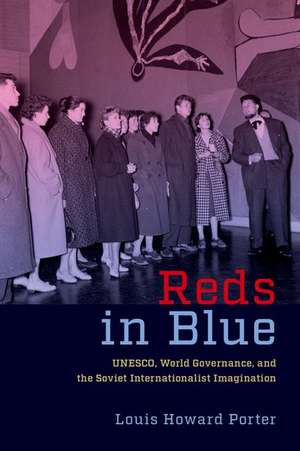Reds in Blue: UNESCO, World Governance, and the Soviet Internationalist Imagination
Autor Louis Howard Porteren Limba Engleză Hardback – 7 noi 2023
Preț: 260.26 lei
Preț vechi: 318.30 lei
-18% Nou
Puncte Express: 390
Preț estimativ în valută:
49.80€ • 51.46$ • 41.43£
49.80€ • 51.46$ • 41.43£
Carte disponibilă
Livrare economică 15-21 februarie
Preluare comenzi: 021 569.72.76
Specificații
ISBN-13: 9780197656303
ISBN-10: 0197656307
Pagini: 320
Ilustrații: 13 black and white halftones
Dimensiuni: 229 x 279 x 19 mm
Greutate: 0.75 kg
Editura: Oxford University Press
Colecția OUP USA
Locul publicării:New York, United States
ISBN-10: 0197656307
Pagini: 320
Ilustrații: 13 black and white halftones
Dimensiuni: 229 x 279 x 19 mm
Greutate: 0.75 kg
Editura: Oxford University Press
Colecția OUP USA
Locul publicării:New York, United States
Recenzii
Over the past decade, historians have finally begun to prise open the 'multiverse' of international institutions, revealing people, ideas, and practices we had long forgotten. Finally, we have a study that begins to fill a persistent gap: the role of people, ideas, and practices hailing from the Soviet Union. Porter's archival work is the foundation for an invaluable new contribution to our understanding of the history of internationalism that pushes us to overhaul our view of the Cold War and later twentieth century.
In this original and fascinating study, Louis Porter shows how participation in UNESCO opened up new worlds of possibility and meaning for patriotic Soviet citizens-even for those who would never travel beyond the USSR's own borders. Reds in Blue reveals how world governance became an arena of both Cold War competition and cooperation as ordinary people on both sides of the Iron Curtain worked to build UNESCO's networks of global solidarity and cross-cultural exchange. With its faithful attention to lived experience, Porter's book is an important contribution to studies of Soviet internationalism, Cold War cultural diplomacy, and of the UN's twentieth-century endeavors to promote peace within a persistently fractured and unruly world.
This book is a well-written and groundbreaking account of Soviet internationalism during the Cold War. It demonstrates how a small elite of Soviet patriotic cosmopolitans influenced UNESCO and its member states and vice versa. Reds in Blue is a must-read for everyone interested in the history of the USSR and its international relations.
In this remarkable book, Louis Porter demonstrates the surprising parallels that existed between Soviet internationalism and the ideals of world governance promoted by UNESCO and other non-communist international institutions. While Soviet history and the history of international organizations have long been approached separately, Porter shows how deeply they were intertwined.
This meticulously researched and elegantly written book will be a welcome addition to our knowledge of the history of UNESCO and the role of the Soviet Union in it, with a focus on individuals rather than the state.
In this original and fascinating study, Louis Porter shows how participation in UNESCO opened up new worlds of possibility and meaning for patriotic Soviet citizens-even for those who would never travel beyond the USSR's own borders. Reds in Blue reveals how world governance became an arena of both Cold War competition and cooperation as ordinary people on both sides of the Iron Curtain worked to build UNESCO's networks of global solidarity and cross-cultural exchange. With its faithful attention to lived experience, Porter's book is an important contribution to studies of Soviet internationalism, Cold War cultural diplomacy, and of the UN's twentieth-century endeavors to promote peace within a persistently fractured and unruly world.
This book is a well-written and groundbreaking account of Soviet internationalism during the Cold War. It demonstrates how a small elite of Soviet patriotic cosmopolitans influenced UNESCO and its member states and vice versa. Reds in Blue is a must-read for everyone interested in the history of the USSR and its international relations.
In this remarkable book, Louis Porter demonstrates the surprising parallels that existed between Soviet internationalism and the ideals of world governance promoted by UNESCO and other non-communist international institutions. While Soviet history and the history of international organizations have long been approached separately, Porter shows how deeply they were intertwined.
This meticulously researched and elegantly written book will be a welcome addition to our knowledge of the history of UNESCO and the role of the Soviet Union in it, with a focus on individuals rather than the state.
Notă biografică
Louis Howard Porter is Assistant Professor of History at Texas State University. His research was awarded the Robert C. Tucker/Stephen F. Cohen Prize by the Association for Slavic, East European, and Eurasian Studies.
